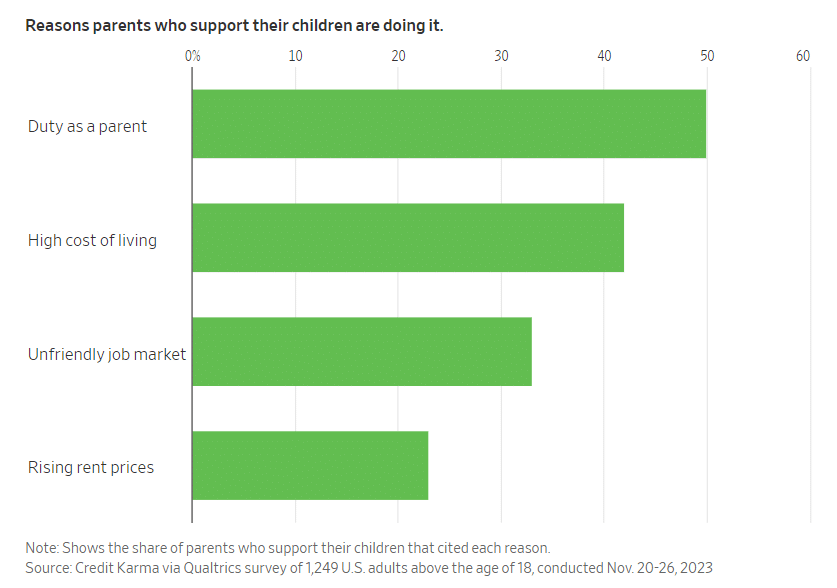
Parents are cutting the financial cord with their adult kids later than ever. They hope it isn’t awkward.
The parents have been paying the monthly phone bill and covering rent for far longer than in prior generations. Some are helping their children with down payments to buy homes. Others are putting a roof over their kids’ heads well into their 20s and 30s to help them save because they can’t cover rising costs of living.
That comes with a price tag. More than a quarter of parents who are helping their children financially said it caused them to postpone retirement, according to a recent Credit Karma survey. More than half had to cut back on living expenses and about a third took on debt.
Feeling stretched, they are negotiating the terms of separation.
Nancy Clark and her then-28-year-old son, Reid Clark, had just sat down to dinner in June 2022 when the conversation turned to when he would move out. The topic had come up before, but this time they decided to set a date one year later.
Nancy, now 60, said she remembers thinking: “I know that becoming financially independent needs to feel a little painful.”
Reid set off on his own last June. He ditched a job managing his family’s three ice cream shops in New Hampshire for a gig as the assistant to a professional ice hockey team’s mascot in St. Paul, Minn. He also works at an M&M’s store.
Nancy bought him groceries when he moved in and occasionally gives $50. By this June, Reid will no longer get any financial help if he’s short. He hasn’t needed to hit up his mom for rent money in the past few months. “I want to chart my own path in life,” he said.
Taking such a gradual approach and framing the conversation around gaining financial independence give it a positive spin, said Rocky Fittizzi, a wealth strategies adviser at Bank of America Private Bank. Telling your children you’re cutting them off suggests it is a punishment.
An emotional decision
Many adult children are living at home, or moving back in, to save money. The cost of food and rent have jumped, and more college graduates are saddled with student debt. The share of 25-to-29 year-olds with student loans rose to 43% in 2022 from 28% in 1992. The rise was even bigger for those between 30 and 34, according to a recent report by the Pew Research Center.
Some 20% of men and 12% of women between 25 and 34 years old lived at home last year, far higher than two decades ago, according to Census Bureau data.
During the pandemic, layoffs and money strains forced some adult children and their parents to live together and share finances, said Arne Boudewyn at Insights Squared Consulting Group, a family wealth consulting company.

Worries over losing the close bonds forged during those years may add to the stress of ending monetary help, financial advisers said.
“Letting go is often harder for parents these days because we need to feel needed as much as we want to feel wanted,” said Bobbi Rebell, the founder of Financial Wellness Strategies, which gives workshops for parents about how to teach their children to be financially responsible.
“
Letting go is often harder for parents these days because we need to feel needed as much as we want to feel wanted.”
Tough love, but not too tough
Pam Lucina still remembers the day about 30 years ago when her father told her she was off the payroll. She was in her first year of law school. Her parents had paid for her undergraduate education. Because she assumed they would pay for law school too, she had chosen a pricey school.
She graduated with $40,000 in student debt and couldn’t afford to contribute to her 401(k) for about five years.
“I know that my parents sacrificed to give me what they did and I’m grateful for all of their past support but I wish I had been more prepared,” said Lucina, 52, now an executive vice president at Northern Trust.
Lucina said the experience was a main reason she became a financial adviser. She has three daughters, and recently asked the oldest to complete her own college financial-aid form.
She tells clients that even if they have good intentions when cutting off their kids, it can feel to the children as if their parents are withholding money to punish them.
“Assure them that love is not contingent on finances,” she said.
Create an exit strategy
There are times when financial help is necessary. With a health issue or addiction, parents often use a special needs trust, where funds typically go directly to the child’s treatment and recovery. Others may opt to help children temporarily after a layoff.
But financial advisers said parents need to set boundaries.
Ashley Kaufman’s parents told her she would need to move out of their Manhattan apartment, where she was living rent-free, once she saved $100,000 for a down payment on her own place.
The cybersecurity consultant hit her goal by the time she was 25, but she wasn’t sure she was ready to move out right then. She enjoyed seeing her younger siblings regularly and playing with her family’s dog named Waffles, she said. Her parents encouraged her to go to some open houses anyway.
Kaufman, who is the stepdaughter of Rebell from Financial Wellness Strategies, is now 27. She bought her apartment around two years ago. She’s happy to be building equity in her place.
“I’m glad my parents gave me a little nudge,” she said.
IMPORTANT DISCLOSURES Broadridge Investor Communication Solutions, Inc. does not provide investment, tax, legal, or retirement advice or recommendations. The information presented here is not specific to any individual's personal circumstances. To the extent that this material concerns tax matters, it is not intended or written to be used, and cannot be used, by a taxpayer for the purpose of avoiding penalties that may be imposed by law. Each taxpayer should seek independent advice from a tax professional based on his or her individual circumstances. These materials are provided for general information and educational purposes based upon publicly available information from sources believed to be reliable — we cannot assure the accuracy or completeness of these materials. The information in these materials may change at any time and without notice.
Prepared by Broadridge Investor Communication Solutions, Inc. Copyright 2021.
